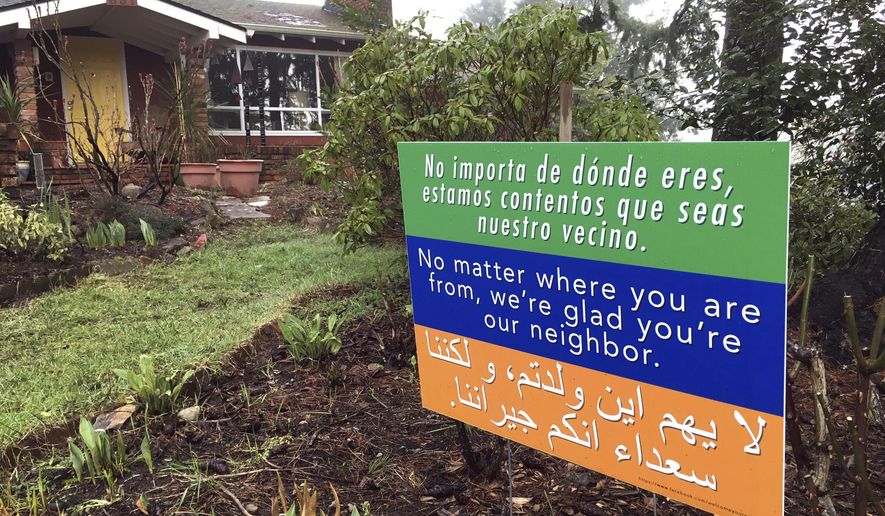Virginia lawmakers are moving to ban so-called “sanctuary” cities, as other regional jurisdictions vow to reaffirm their sanctuary status in response to President Trump’s crackdown on illegal immigration.
The Republican-controlled General Assembly approved Wednesday a bill that would bar local governments from restricting the enforcement of federal immigration laws. Democratic Gov. Terry McAuliffe has promised to veto the legislation.
The Virginia proposal backs the president’s efforts to curb illegal immigration, which include an executive order to withhold federal funds from jurisdictions that inhibit the enforcement of immigration laws. His order has galvanized opposition among some local officials, who say the Trump directive’s language is unclear and its ramifications unknown.
In Maryland, Takoma Park Mayor Kate Stewart said her administration will consider accepting donations from wealthy residents if the city loses roughly $90,000 in federal Community Development Block Grant funds for being a sanctuary for undocumented immigrants.
“We have had residents who have approached us to say that being a sanctuary city is very important to them,” Ms. Stewart said. “What is coming out of this current administration are policies that create fear. Right now, my top priority is to make sure all of our residents feel safe.”
Ms. Stewart said she and other officials are trying to figure out how the executive order could affect government services in Takoma Park, which has billed itself as a sanctuary city for more than 30 years.
“What the executive order actually means and what, if any, federal funding we may lose is still not completely clear to us,” the mayor said. “But how we will operate has not changed.”
In the nation’s capital, D.C. Mayor Muriel Bowser vowed last month to maintain the District’s sanctuary status, potentially risking the loss of $1 billion in federal grants.
D.C. Council members are keeping that risk in mind as they determine budget priorities for the next fiscal year, said Bowser spokesman Kevin Harris.
“Obviously any loss of funding presents challenges, but the Mayor has been clear that we cannot compromise our values,” Mr. Harris said in an email. “There are certain things we believe in as a city and that are important to residents and it’s our job to figure out how best to deliver on those so we always have to keep all options on the table.”
Though Mr. Trump’s order targets “sanctuary” jurisdictions, there is no legal definition for what constitutes such an entity. The term is used broadly to refer to municipalities that do not allow local law enforcement officials to cooperate with federal immigration agencies in an effort to shield undocumented residents from detention and deportation.
Some cities have directed police officers not to inquire about immigration status during encounters with residents. In other jurisdictions jails refuse to comply with requests from Immigration and Customs Enforcement to detain illegal immigrants beyond their scheduled release dates.
Maryland state Sen. Michael Hough has introduced a bill to require local and state correctional facilities to notify the Department of Homeland Security before releasing any inmate for which the department has an immigration detainer.
“It’s pretty commonplace to hold people on [Drug Enforcement Administration] detainers; Alcohol, Tobacco and Firearms detainers; or any other type of detainer,” said Mr. Hough, Frederick Republican.
Meanwhile, Howard County Council member Jennifer Terrasa recently co-sponsored a bill that would establish the Maryland county as a sanctuary for undocumented immigrants, although the word “sanctuary” was dropped from the bill’s title before it passed.
Howard County Executive Allan Kittleman, a Republican, vetoed the legislation, calling it a “hollow political statement that provides a false sense of security” for people who illegally live in the country.
In Virginia, the city of Richmond and Chesterfield County have adopted sanctuary-style policies but have shied away from using the hotly debated label.
Richmond Mayor Levar Stoney issued a directive reiterating the city’s existing policies and pledged a commitment to “protect and promote policies of inclusion,” but deliberately left “sanctuary city” out of its wording.
“The term ‘Sanctuary City’ is often used derisively by immigration opponents to undermine community policing policies,” Stoney spokesman Jim Nolan told the Richmond Times-Dispatch. “In fact, community policing policies are about providing public safety services to both immigrant residents and the entire community. That is what we will do, and that is what the Mayor’s directive affirms.”




Please read our comment policy before commenting.